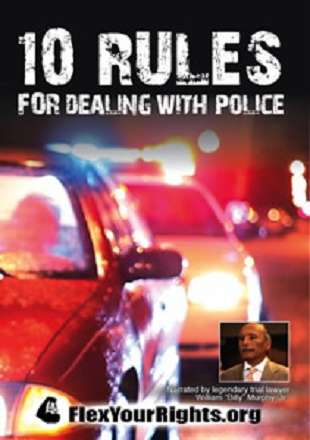DEALING WITH THE POLICE UK: 10 basic rules and rights for handling police encounters.
What happens if you allow law enforcement access to search through your home and personal belongings?
How does answering incriminating questions worsen your constitutional protection? In fact, can it even get you arrested?
Ten Rules for Dealing with Police
These 10 rules for dealing with police officers should lower tension between citizens and the powers of police forces in the United Kingdom. But, always seek professional advice if you get into trouble with the police.
1. Remain Calm
If you get approached or pulled over by the police, the number one rule is staying calm and rational. You may feel frustrated or even angry about how to deal with the police.
But displaying an aggressive or abusive demeanour to a cop is sure to land you in even bigger trouble. As a rule, a bad outcome results from a bad attitude during a conflict.
2. Stay Silent
Police Officers get trained in the methods of asking you incriminating questions. But, your constitutional and basic rights when dealing with police allow you to remain silent.
Note: Staying quiet will not harm your defence and cannot hurt you in the eyes of the law.
3. Refusing a Search
You can refuse a search by the police according to your rights against police. Refusing a search cannot be used against you.
Nonetheless, knowing this rule about your exemption is unlikely to deter the police from continuing their investigation. They will make an attempt to shake your confidence.
Police officers may threaten to call in drug enforcement and remind you that cooperation is easier. Even so, in this list of ten ground rules, staying calm and collected remains the best advice.
4. Being Tricked
Even though you may understand your rights against police, and assert them in a calm manner, police may try to trick you. The rights of police mean they can legally trick you or lie to you.
Know Your Rights UK Police: Do not get tricked!

5. Determine Your Detention
During a police interview you can determine your freedom status at any time and ask whether you are free to go? Police officers need evidence to detain you in custody.
6. Dumb Acts are Dumb
There are some ground rules for dealing with the police in the United Kingdom. Always refrain from performing dumb acts and exposing yourself to anything which makes you an easy target.
Doing something stupid or dangerous could put you on the wrong end of a Taser. Such encounters often determine the outcome between a minor infringement and a serious incident. This rule applies even if you are innocent of the original crime.
7. Do Not Run Away
If you run they will catch you. Whether you are guilty or not, running away from the police will undoubtedly result in a worse, and usually a more regretful, situation.
8. Never Touch a Police Officer
It is a bad idea to touch a policeman. Aggressive behaviour towards a cop warrants an aggressive response by the police.
9. Report Acts of Misconduct
Police forces urge the public to report all acts of misconduct. So, be a good witness for them and contact the police with any helpful information.
10. Your Home is Protected by UK Law
British law protects your private dwelling and belongings from invasion and search by the police. Exceptions apply if they are in possession of a warrant or have strong evidence of a crime. In UK policing terms this is ‘having probable cause‘.
There is no legal obligation for you to let police officers inside your home. They need your permission if they do not have a valid warrant. It is also worth noting that, as a rule, granting the police permission to enter your privacy may affect your legal protection and their culpability.
Probable Cause UK Definition
Note: The definition of probable cause in the United Kingdom may differ to other countries. As a rule, having probable cause means police officers can make an arrest based on suspicion. They must believe the probability that a crime got committed and their suspect probably committed it.
ALSO IN THIS SECTION
What is the Meaning of Legal Rights?
In most civilized constitutions, it is widely accepted that everyone has the legal right to life, liberty, and security. A person’s legal rights should not be deprived thereof except in accordance with the principles of fundamental justice. As a rule, everyone has the right of personal safety and to be secure against unreasonable or unauthorized search or seizure.
Do I Have to Give My Name to a Police Officer?
UK law does not require you to give your name to a police officer unless you are under arrest. In actuality, it is a criminal offence not to provide your proper name if you are being arrested. Note that giving a false name is a very serious offence punishable by English law.
Can the Police Enter Your Home Without a Warrant?
As a general rule police officers may legally search any area. They can also seize incriminating evidence from you if it is clearly visible to them during the search. The police may carry out a search (and seize evidence from your home) without a search warrant if they see an illegal act occurring outside of your home.
How Long Can the Police Detain You?
The police are authorized to detain you for up to 24 hours. The law says they must then release you, or charge you with a crime. In some serious circumstances (such as homicide cases) they may be able to hold you up to 96 hours. The United Kingdom Terrorism Act permits an arrestee to be detained for up to 14 days and without charge.

